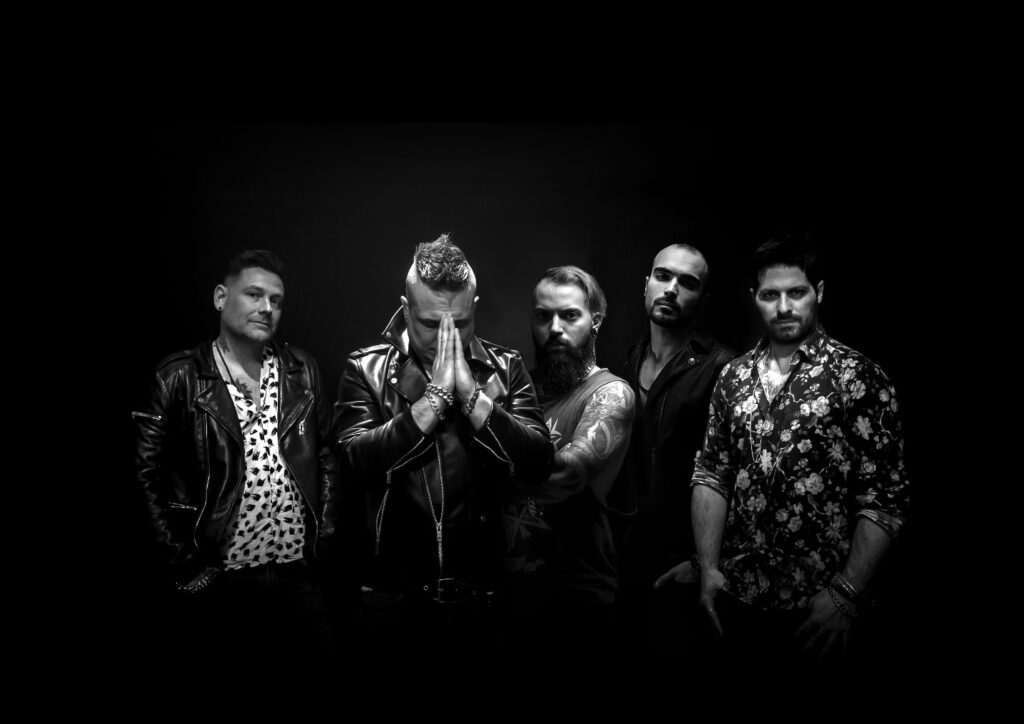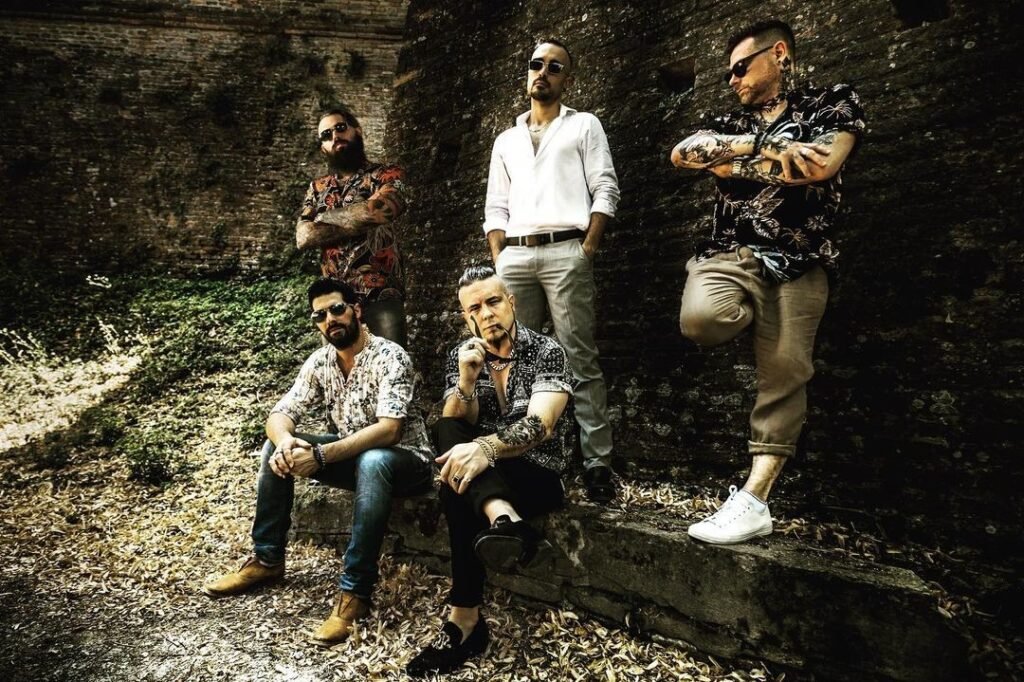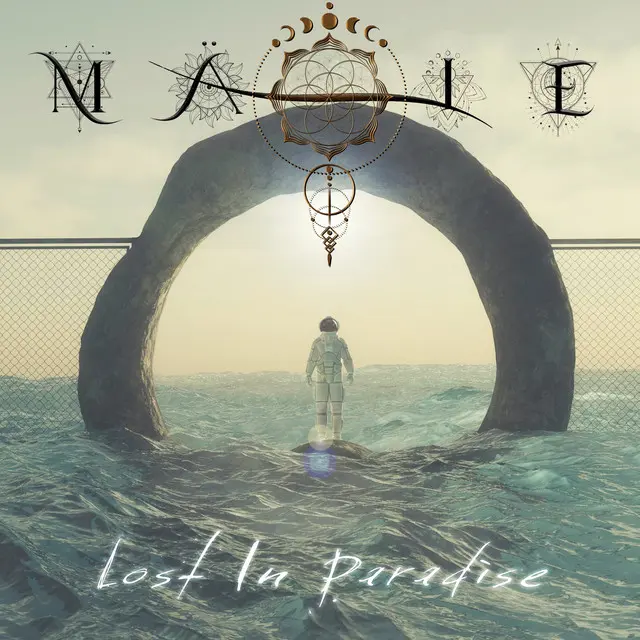Mäle is the brainchild of Alessandro Medri, an Italian songwriter, vocalist, and guitarist, and Mike Krompass, a British/Canadian multi-platinum producer and multi-instrumentalist. Mäle’s music is an intense blend of Italian melodic audacity and British taste for outrageous and beautiful strength.
Mäle lets out a roar of emotions in their track “Lost In Paradise.” This astounding piece has epic vocal passages with electrifying guitar bits, and the chemistry is pretty intense to witness. From high-volume screaming to thunderous drumming, “Lost In Paradise” feels like Mäle’s inevitable rise. Check out the song and the exclusive interview below:

1. Can you tell us a bit about where you come from and how it all got started?
MÄLE: In the beginning, it was Alessandro Medri, myself, Matteo Troiano, and Jonathan Montalti. Our former bands, Figure Of Six and Creep, were part of a long-standing metal brotherhood well rooted within the Italian peninsula, and after the end of that era, we wanted to bring something new to life. I had songs, so we started pre-producing them every Wednesday.
2020 marked the fortunate encounter with Mike Krompass (Nelly Furtado, Smash Mouth, Steven Tyler, Billy Sheehan, Dead Romantic …) who recently moved to the UK from United States.
And then it began: back and forth from Italy to the UK during COVID and many wonderful experiences and incredible music with Mike.
We just had time to shoot a few videos and take some photos, and on January 2023, we released our first single, ‘Lost in Paradise,’ which is taken from our forthcoming full-length album, written in Italy at Accademia 49 and recorded and mixed at BASE Culture Studios in Sheffield, UK. The full line-up now is Alessandro Medri singer/band leader, Mike Krompass on lead guitar, Andrea Macrelli on Guitare, Jonathan Montalti on Bass and Mattia Vagnoni on Drums.
2. Did you have any formal training or are you self-taught?
MÄLE:
Alessandro:
I started studying music when I was 11 and never stopped since. I’m so passionate about music education that I even opened a music and dance academy with my wife in 2011.
I initially studied classical guitar, but later switched to contemporary music. After I got my guitar diploma, I started vocal training with Cheryl Porter while she was living in Italy.
Mike began his career in Toronto Canada as a top studio/ live session guitar Player and music Director. He is now a Multi-Platinum Record Producer, Guitar Player, Mixer, Engineer, Multi-Instrumentalist and Label CEO.
Andrea:
I started rhythm guitar at 10yo. Then at 12yo, I started studding with Alessandro for 10 years, between guitar and vocals and an additional year to resume theory/harmony leaving the metal perspective that had guided my studies (also based on my projects at the time).
Jonathan:
In addition to a few private lessons and a year of jazz school (2003), I did 3 years at the music academy in Bologna without completing the degree course.
Matthias:
I did 6 years of study with a private drum teacher.
3. Why the name ‘MÄLE’?
MÄLE: “Mäle” (pronounced /ˈmale/) is an Italian word that translates to “bad, wrong, or evil.”
In Italy, superstition plays a significant role in shaping the way people think and it’s a common habit to wish the worst in order to wish the best. Instead of wishing someone “good luck,” they might say something that sounds like “I hope to see you die inside the mouth of a wolf” or “I hope to see you inside the ass of a wheal”.
It’s pretty usual to get pissed if someone wish you the real “good luck”, because it sounds like they’re actually wishing you bad luck…
Mäle, similar to the gesture of making horns with your fingers made famous by Ronnie James Dio, is considered as a way to ward off evil energy and protect oneself from negative influences.
As its core, “Mäle” serves as a criticism of the universal human habit of instinctively reacting to new experiences and ideas with superstition and negativity instead of embracing positive thinking.
4. Who were your first and strongest musical influences?
Alessandro musical influences include blues, jazz, classic rock, metalcore, pop, reggae, ragamuffin, hard rock, Britpop, garage, progressive, jazz fusion, pop punk, melodic hardcore, and California punk rock, Country, American Songwriting, Italian Alternative Rock, Funk, RnB, Gospel… It looks crazy and random, but it’s not.
These influences are seen also in the other members, which leads to Mäle musical style being alt rock, progressive rock, progressive metal, electro pop, electro rock.

5. What do you feel are the key elements in your music that should resonate with listeners, and how would you personally describe your sound?
MÄLE:
Our sound is rough and gentle. Dark and shiny. Like a sun rise from the space, while you’re drifting in nowhere. It’s ambiguous and direct, squared and circular. Deep but not enough for the listener to fear the fall.
Sonically, the production is a masterpiece of punchy modern rock vibes, crafted with old fashion artistry by the most astonishing rock producer the European continent has ever had. The drums are insane and the guitar production comes from another universe. Just take a listen to the solo in “Lost in Paradise” and you’ll get a glimpse of what you can expect from the rest of our songs.
6. What’s your view on the role and function of music as political, cultural, spiritual, and/or social vehicles – and do you try and affront any of these themes in your work, or are you purely interested in music as an expression of technical artistry, personal narrative, and entertainment?
MÄLE:
Music is a language that expresses and elicits emotions. It speaks directly to the heart and guts, while words are more for the mind. Our goal is to strike a balance between these two systems, conveying universal themes through clear imagery rooted in reality.
The song “Lost in Paradise” addresses the feeling of “nothingness” that arises when we contemplate the idea of floating and drifting in space.
It’s similar to the sensation of free-falling in an elevator or the turmoil of leaving or loving someone.
In your stomach, right? Every time I listen to it, I can feel that.
Or “Hurt Me with your love”, one of the 10 songs of the forthcoming album, unreleased yet. It’s about the dark side of love. When you realize you are addicted to the toxic part of a person and there’s actually nothing wrong with that because you just realize it’s not the only part you love.
Love is complex like a major progression with a minor feeling, as Hurt Me With Your Love is.
So yes: narrative, philosophy, human complexity and the thrill to find the same things on the sonic level through technical artistry.
7. Could you describe your creative processes? How do usually start, and go about shaping ideas into a completed song? Do you usually start with a tune, a beat, or a narrative in your head? And do you collaborate with others in this process?
MÄLE:
I’m a songwriter who primarily writes on acoustic guitar or piano. This solo aspect of my craft is very intimate and something I truly cherish. Just like with wine, I believe that my songs need to mature over time. If I still love them after a certain period, then they deserve to be given the opportunity to grow further through pre-production. This usually involves using VST and raw tracking, but with a focus on creating a realistic arrangement and sonic direction.
Pre-producing and producing with friends are undoubtedly what I really love to do as an artist.
8. With social media having a heavy impact on our lives and the music business in general, how do you handle criticism, haters, and/or naysayers in general? Is it something you pay attention to, or simply ignore?
MÄLE: Good critics are pure gold. Hating is a plague. I feel so sorry for people who use their time on earth to insult others for no reason. I mean, I don’t care if someone insult me on a social, it’s not a big deal because it’s not my problem. But I actually feel sorry for this person, it’s depressing. We need to inspire and be inspired. Hate is poison but still a way to express something. I can feel their pain, and it make me sick. But not enough to ruin my daily toilet moment.
9. Creative work in a studio or home environment, or interaction with a live audience? Which of these two options excites you most, and why?
MÄLe: Both experiences are incredibly thrilling. The scent of a recording studio, the gentle feeling in your ears, the pursuit of perfection – it’s all so magnificent.
As much as the lights of a rock club, the stage vertigo, the adrenaline and the VIP view on people having fun, the best moment to look at a person in the eyes.
10. Do you think is it important for fans of your music to understand the real story and message driving each of your songs, or do you think everyone should be free to interpret your songs in their own personal way?
MÄLE: The goal should be to write songs that reflect the light of others. This is the first step towards success. The final level is having people who are genuinely interested in understanding the reason behind your writing.
KEEP IN TOUCH:
FACEBOOK | INSTAGRAM | SPOTIFY | WEBSITE | YOUTUBE


